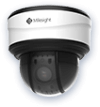Introduction
License plate recognition (LPR/ANPR) cameras, are a specialized type of video surveillance camera designed to recognize the numbers and letters of license plates on still or moving vehicles. They are designed with built-in algorithm that compensates for speed, weather, and headlight glare, which are typically for traffic solutions. Designing a surveillance system to monitor traffic and capture license plates is a more technical process than designing a traditional security camera system.
What Is License Plate Recognition (LPR/ANPR)
License Plate Recognition
License Plate Recognition is a technology that uses optical character recognition on images to read vehicle registration plates. It can use existing closed-circuit television, road-rule enforcement cameras, or cameras specifically designed for the task to store the images captured by the cameras as well as the text from the license plate.
How License Plate Recognition Works
License plate recognition involves capturing photographic video or images of license plates, whereby they are processed by a series of algorithms that are able to provide an alpha numeric conversion of the captured license plate images into a text entry.
Milesight License Plate Recognition
Milesight LPR/ANPR is embedded in Milesight Network Cameras. It automatically detects and captures licence plate in real time and then compares to a predefined list. Independent of the back end products, they are able to achieve standalone LPR functionality, realizing the further black and white list management.
Core Value of Algorithm Technology
The core dependence of any License Plate Recognition system is the effectiveness of its algorithms. The algorithms are quite meticulous and typically require hundreds of thousands lines of software code to compensate for such complexities. As a whole, a series of five primary algorithms are necessary for a License Plate Recognition system to be successful.
License Plate Localization
Localizing is an algorithmic function that determines what aspect of the vehicle's image is the license plate. For example, the algorithm must rule out a vehicle's mirror, grill, headlight, bumper, sticker, etc. In general, algorithms look for geometric shapes of rectangular proportion. (Figure 1)

Optimal Size and Orientation
They are components of algorithms that adjust for the angular skew of the license plate image to accurately sample, correct, and proportionally recalculate to an optimal size.
Note: The license plate should be more than 130 pixel in width and no more than 5° tilt; The recognition of vertical and horizontal angle should be less than 30° and no more than 30° respectively. (Figure 2)

Character Segmentation
It is a algorithm that locates the separate alpha numeric characters on a license plate, which is able to figure out the letters and numbers for different countries and regions. (Figure 3)

Optical Character Recognition (OCR)
It is a algorithm for Translating the captured image into an alpha numeric text entry. (Figure 4)

Recognition Confidence Level
It is a algorithm to ensure the accuracy of the recognition to avoid the confusion of some similar characters. For example, the letter “I” and the number “1” which are alike could be rightly distinguished and correctly outputted. So does the letter “E” and the number “3”. (Figure 5)

How Milesight LPR Network Camera Works
Step1: After log in the web, and go to Advanced Settings → LPR → Settings. Check the checkbox Enable License Plate Recognition, you can draw the screen to select area interested; (Figure 6)

Step2: Schedule Settings. You can draw the schedule by clicking Edit button. And then click Save or Reset after setting. You also can copy the settings to other channels;
Step3: Save all the settings;
Step4: Output result. The results from LPR detection will be displayed on the page shown below. And the information could be exported by clicking the Log Export button. (Figure 7)

Regional Support of Milesight LPR Network Camera
Vehicles are large mass objects with a variety of shapes, designs and colors. Algorithms must be able to determine what part of the vehicle is actually the license plate. Different countries, states, cities and regions have different standards, dimensions, colors and character sets for license plates. This inconsistency requires algorithms to be inclusive to such extensive criteria. Milesight LPR Cameras support 51 regions and countries so far mainly for the European areas. (Figure 8)

Typical Applications

Key Features of Milesight LPR Network Cameras
- · Recognition Accuracy Reaches 95%
- · Highest Recognizable Speed of 120km/h
- · Compliant with CGI and Other Third Party VMS
- · Ultra High Frame Rate up to 120fps
- · 3 in 1 Super WDR Pro
Related Products
Conclusion
Reliable License plate recognition(LPR/ANPR) has traditionally been costly and only relevant for a limited number of applications. The rapid development of network cameras now allow for wider use of LPR solutions. They are of great help for increasing efficiency and security, and will become more widely used in the coming days.




